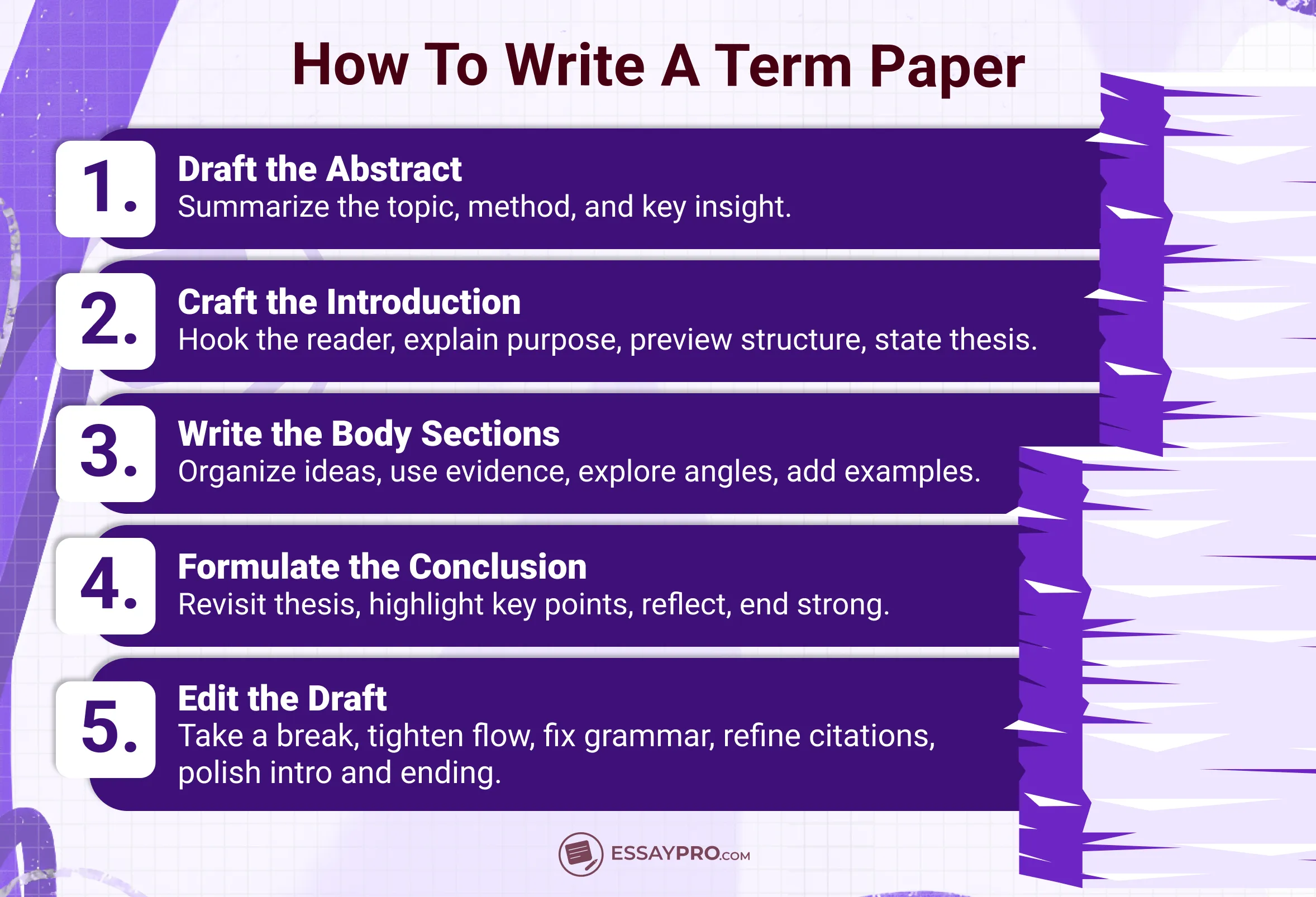Term papers are parts of academic writing students submit at the end of the year to prove they truly understand what they've learned. It requires a mix of research and analysis, paired with your own voice, to form one detailed document. These steps usually keep the process on track:
- Drafting the abstract
- Writing the introduction
- Building the body paragraphs
- Crafting the conclusion
- Proofreading and editing
This guide will teach you the term paper format and how to handle each part. Still, writing doesn't always cooperate. That's where having backup makes all the difference. Students often go searching for a term paper for sale, and EssayPro always steps in with real help.
What Is a Term Paper
A term paper carries weight because it shows how well you can use the material you've learned beyond the classroom. It's proof you've been paying attention, proof you can take what you know and do something with it.
Every subject shapes this task differently. In history, you might find yourself unraveling the chain of events that caused World War II. Psychology could have you tracing how stress leaves its fingerprints on mental health. Environmental science? You might track the ripple effects of climate change in one small corner of the world and explain why it matters.
The term paper itself asks for more than a pile of facts. It wants order. It wants insight. You have to analyze and stitch everything together so it makes sense to others, too. Writing a term paper means building arguments that connect and citing reliable sources to support them. All this will shape your paper into something polished rather than tossed together at the last minute.
When the words refuse to come, an expert essay writer from EssayPro can help you put your paper together.


How to Start a Term Paper
The hardest part is usually getting started. Take a moment to check the format, first of all. Every small detail matters here. Even the wrong font can cost you those much-needed points. If anything feels unclear, it's best to ask upfront rather than spend time fixing mistakes later. Here's how to set term papers in motion:
- Refine your topic. Pick something that keeps you curious. That's almost a non-negotiable. A good topic makes everything feel less like a grind. Brainstorm initial ideas and figure out how to research a topic to find more than surface-level answers.
- Hook your readers. The opening line shouldn't just introduce the subject and call it a day. Surprise your reader. Throw out an unexpected fact. Ask a controversial question. You want them interested, not reading because they have to.
- Craft a clear thesis statement. Your thesis is the anchor. Here's a rule of thumb: narrow your topic down if you can't sum up the main idea in a single sentence (two sentences, at the absolute max). Look at a thesis statement example to see what works.
- Understand the style requirements. Every instructor has rules, each with its own quirks. Read the guidelines to see what term paper format (MLA, APA, Chicago) you're required to use.
- Dig deeper with research. Collect sources, but only the ones that actually strengthen your arguments. That also means sticking to credible materials you can trust.
- Start writing. The perfect first line probably won't come out of thin air. Get words on the page. You can fix them later. What matters is that the more you write, the clearer everything becomes.
You don't have to do it all alone, though. Term paper writing services like EssayPro can guide you through each step, so your final work is something you're proud to submit.
Term Paper Outline
Before writing a term paper, sketch out a roadmap that feels alive. The outline is your safety net: it keeps your thoughts from scattering all over the place. Glance at your instructor's rules first because small format details can mess with the flow if you ignore them. Here's a simple structure:
- Title Page: Put your name, course number, instructor's name, and deadline right there on the front.
- Abstract: Give a quick glimpse of what's inside. Tell the reader why your paper even matters and which arguments it will cover.
- Introduction: The term paper introduction has to pull weight. It should start with something clear that explains in more detail why the topic deserves attention and hints at the path the paper will take.
- Body: Roll up your sleeves. Share what you researched and break it apart so it actually makes sense to someone reading it. Bring in other perspectives too, not just your own, and don't shy away from digging deep.
- Results: Talk about what your research led you to. Point out the discoveries, the surprises, and maybe even how your own view shifted while writing a term paper. These findings give the paper its edge.
- Discussion: Conclude your term paper with a finish that sticks. Pull the main points together and say what they mean in the bigger picture. Bonus points if you leave readers with a thought or a question that lingers after they close it.
How to Write a Term Paper with 5 Steps
Everything starts with the proposal. Think of it as your opening move, the piece that convinces your instructor the topic deserves attention. Drop in credible references and make the connection to your course impossible to miss. Lay out what you hope to accomplish, not as a checklist but as a clear direction.
Now, let’s talk about the five steps you’ll have to walk through when crafting your term papers. And if it doesn't click right away, you can buy term paper to keep moving.

Draft the Abstract
The abstract is tiny, yet it decides if someone keeps reading. It's not a place for filler or formalities. It's the part where you grab attention with almost no space to do it. When writing a term paper, think of this as a quick window into the whole thing: what problem you're dealing with and what came out of that effort. Mention it in a way that feels alive, not mechanical.
If your paper covers social media and mental health, hint at the methods and findings that surprised you the most, then step back. It should leave the reader curious. When words won't flow or the tone feels flat, there's no harm in letting a dissertation writing service step in and shape it into something worth reading.
Craft the Introduction
The first few lines of a paper decide how the rest feels. A dull opening makes readers skim. A sharp one pulls them in. The introduction in a term paper has to show why the topic matters and hint at where the argument is going, all in a few sentences.
- Interest the audience: Open with a bold fact, maybe even a surprising statement. You want them leaning closer, curious about what comes next.
- State the purpose: Tell them what the paper is about and why it matters. A term paper only works when the reason behind it is crystal clear.
- Give an outline: Give a sneak peek into what's coming. Just enough so readers know the path you'll take.
- End with a thesis: Close the introduction with a line that carries the argument. In a term paper, this thesis is the thread tying everything together.
Generate Ideas and Compose Text: Body Sections
The body of your term paper is where the real work happens. This is the core of the entire project, where evidence builds and ideas turn into something worth reading. Here's how to shape it so it doesn't fall flat:
- Shape your ideas with structure: Break the body into sections that make sense, each focusing on one clear part of the topic. A term paper on social media and relationships, for example, might separate communication and privacy without turning into a mess.
- Let evidence carry the argument: Use data and studies to hold up your points. Readers trust what they can see, so bring numbers and facts that matter. A good research paper writer will know where to find them.
- Show more than one side: Real topics have layers. For example, when writing about controversial dissertation topics, walk through both the benefits and concerns. It makes the argument stronger and the paper harder to ignore.
- Keep examples alive: Use real events and relatable scenarios so the text doesn't feel distant. Talking about climate change? Mention the flood or the drought someone actually lived through.
- Slip in questions that make them think: Drop questions that stop readers for a second. A term paper on AI could ask, What happens to human work when machines stop needing us? Questions like that keep minds awake.
Formulate the Conclusion
Things settle into place in the last section. Approach this part with more attention because a weak ending will have no impact on the reader. A strong one? It will linger long after they finish reading. When writing a term paper example conclusion, keep these in mind:
- Circle back to the thesis: Bring your central idea back into focus. Restate it in a way that feels fresh, not copied.
- Pull the key ideas together: Revisit the strongest points from the body of your term paper without rehashing every detail. A few sharp sentences can show how the pieces connect.
- Show why it all matters: Step back and explain the weight of what you've argued. Stress why those findings deserve attention now, not later.
- Add your own reflection: Let a bit of your voice in. Share what shifted in your perspective or what you think others should consider after reading. It keeps the ending human.
- Close with impact: Leave readers with something to chew on. It could be a call to action or a question that sticks. When you conclude your term paper like that, it stays with them.
Edit and Enhance the Initial Draft
Finishing the first draft means the real work begins. The proofreading process is where the paper turns from rough to sharp, something worthy of attention.
- Step away, then return: A short break clears your head and helps you spot mistakes you missed.
- Look at the structure: Read it through to see if it flows naturally. The introduction should lead smoothly to the conclusion without any bumps.
- Cut what drags: Remove words that weigh the sentences down. Clear and tight writing always feels stronger.
- Proofread the details: Grammar slips and style inconsistencies - fix everything now.
- Check every citation: Make sure references are correct and complete. They matter more than you think.
- Get someone else to read it. A second set of eyes finds things you've trained yourself to ignore.
- Revisit the opening and closing. They're the first and last thing your reader remembers, so make them hit harder.
- Check if every idea connects back to your thesis. If something wanders, either bring it in line or cut it loose.
- Read it aloud. You'll hear where it stumbles, even if you didn't notice while scanning silently.
- Finally, give it one last look. That final sweep smooths out the rough edges and leaves you with something that feels finished.
Term Paper Format
The term paper format helps the piece feel complete. The right structure and citations show you know the rules of academic writing and respect them. Skipping details when formatting your term paper can cost you more than you expect.
- Follow the right style: Social sciences usually stick to APA, while humanities lean toward MLA. Always check what your instructor wants.
- Know how to cite term paper sources: For APA, include the author's name, book title, year, publisher, and location. MLA asks for the publication name, date, and location instead.
- Keep everything consistent: Headings, margins, spacing... all those little things matter.
- Avoid plagiarism by citing properly: Every fact or idea borrowed from someone else must have a proper reference.
- Stick to the guidelines: When in doubt, follow the instructions from your professor.
Term Paper Example
To access our term paper example, simply click the button below.
The timeline of events from 1776 to 1861, that, in the end, prompted the American Civil War, describes and relates to a number of subjects modern historians acknowledge as the origins and causes of the Civil War. In fact, pre-Civil War events had both long-term and short-term influences on the War—such as the election of Abraham Lincoln as the American president in 1860 that led to the Fall of Fort Sumter in April of the same year. In that period, contentions that surrounded states’ rights progressively exploded in Congress—since they were the initial events that formed after independence. Congress focused on resolving significant issues that affected the states, which led to further issues. In that order, the US’s history from 1776 to 1861 provides a rich history, as politicians brought forth dissimilarities, dissections, and tensions between the Southern US & the people of slave states, and the Northern states that were loyal to the Union. The events that unfolded from the period of 1776 to 1861 involved a series of issues because they promoted the great sectional crisis that led to political divisions and the build-up to the Civil War that made the North and the South seem like distinctive and timeless regions that predated the crisis itself.
Final Thoughts
The end of the term has a habit of testing you. Nothing seems to move at first. Then, little by little, the pieces begin to fall into place. You pick a topic, and slowly the arguments form, and before you realize it, writing term papers seems to flow on its own. That messy process is where you learn.
But if we're being honest, not every paper flows like that. Some fight back. Ideas stall, and the structure almost refuses to cooperate. When you feel yourself getting stuck in that loop, outside help becomes more valuable than you think. EssayPro is here for those very moments, offering writing support and the academic guidance students need to finish strong.
Stuck on Formatting?
Leave it to the professionals to make sure your paper is well-organized and easy to follow.
FAQ
What is the Difference Between a Term Paper and a Research Paper?
A term paper is written at the end of a course to show how well you understand the material. A research paper goes further: it requires deeper investigation and original insights beyond a single class. Both demand analysis and structure, but a term paper proves what you've learned, while a research paper adds something new to the topic.
What is the Fastest Way to Write a Research Paper?
The quickest approach to the term paper writing process is to plan ahead. Gather reliable sources, outline the structure, and draft without overthinking.

Daniel Parker
is a seasoned educational writer focusing on scholarship guidance, research papers, and various forms of academic essays including reflective and narrative essays. His expertise also extends to detailed case studies. A scholar with a background in English Literature and Education, Daniel’s work on EssayPro blog aims to support students in achieving academic excellence and securing scholarships. His hobbies include reading classic literature and participating in academic forums.
- Writing a Term Paper. (2024). Munich-Business-School.de. https://www.munich-business-school.de/en/l/guide/writing-a-term-paper
- talks.cam : Tips for Writing College Term Papers. (2025). Cam.ac.uk. https://talks.cam.ac.uk/show/index/118198






